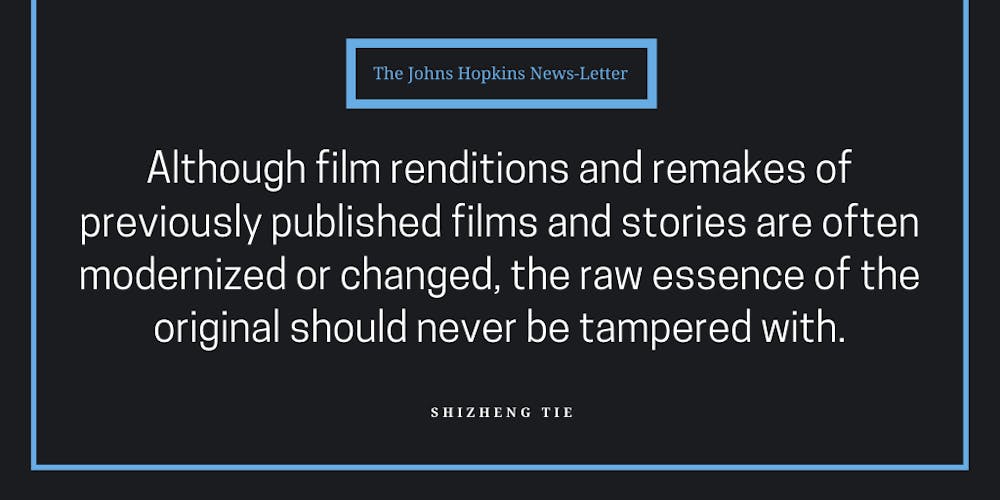After rounds of delays due to the pandemic, the grand release of the live-action movie Mulan had gained a lot of hype and excitement. However, this only made it extra disappointing when I finally watched it. After its release in Chinese cinema on Sept. 11, the rating dropped sharply to 4.9/10 on Douban within two days.
So, without a doubt, I am able to say: I did not enjoy the movie at all nor the cinematic imperialism it represents.
The story follows the journey of Mulan, who has been scolded by her mother from a young age to be less plucky. “A daughter brings honor through marriage,” her mother tells her. But when Mulan’s father, a wounded warrior, must join the army to maintain familial honor, Mulan grabs his sword and rides off into the night and sacrifices herself to protect him.
I’m not sure if the first trace of discomfort crept in at the sight of the bamboo Fujian Tulou, an architectural staple of the southern regions in Qing Dynasty, in a plot based in Northern-Wei-Dynasty folklore, or at the characters’ melodramatically gouache and showy makeup, or at the overdramatized Chinese outfits. However, this film feels more like a classic, hero-complex Hollywood movie about individualism than the original Chinese story.
The traditional concepts of “loyal brave true” have merely become a lazy simplification and an unjustified deviation in this film. The brave girl going into war in place of her father out of zhong (loyalty) and xiao (filial piety) is ironically underrepresented.
Then came even more bizarre plots: Xianniang, the shapeshifting sorceress, is suddenly able to turn into an ornate hawk in the live-action film. Chi and the phoenix, despite their feministic, self-actualizing connotation, feel as if Mulan gained her strength through some Hogwarts-style bestowment instead of her own innate, commendable determination.
The storyline is no longer that of Mulan and her cultural background, but one of a Game of Thrones-inspired action movie with a random Chinese girl cast as the protagonist. Although film renditions and remakes of previously published films and stories are often modernized or changed, the raw essence of the original should never be tampered with.
Mu Lan Ci (The Ballad of Mulan), a folklore song of the Northern and Southern-Wei Dynasties (420-589 AD), tells a tale of romanticism that persists despite tribal wars, unstable societies and immutable gender roles. But in Mulan, as well as other Hollywood movies attempting to portray a foreign culture, Eastern elements are more casually used to spice up the storyline and allure the audience with something “new” or “exotic,” even when they aren’t always necessarily true.
On a more surface-level viewing, however, Mulan 2020 also managed to include certain improvements from the animated version of 1998. Featuring a dragon sidekick, a panda for riding and white rice being served in every scene involving food, the movie almost creates a potpourri of Chinese elements that can typically be found in books.
Nonetheless, while the 1998 version kept true to the zhong-xiao gist of Chinese culture and Mulan’s inner struggle between keeping true to herself and dishonoring her family, the 2020 rendition failed to do so.
The frustration after watching Mulan and the dichotomy of reviews made me think a lot about other Hollywood movies, and I realized I didn’t like Mulan only because I am a Chinese person who is aware of what Mulan actually represents. She belongs to China and Chinese people and represents the history, morality and sense of ideals unique to their culture and traditions.
But even if I wasn’t someone of Chinese descent, I would still want to understand the Chinese culture better after watching a movie about it because any film should be educational in some regard, even if it is a remake of an animation. But there is not much to be learned from the content displayed in this movie.
Sadly, this misrepresentation is normal in Hollywood. And even moreso, no distinct cultures exist in Hollywood, which makes Mulan just like other past hit-movies, such as Aladdin and Black Widow, where an artificial representation of an “exotic hero” is portrayed.
But Mulan is not exotic to me. I know what The Ballad of Mulan embodies and what is expected of a Chinese girl under traditional values. I feel lucky that I know better than to trust a film to teach me about a culture. Yet I am also saddened, more times than not, at the fact that the Hollywood film industry can get away with so much unfair representation and cultural appropriation.





